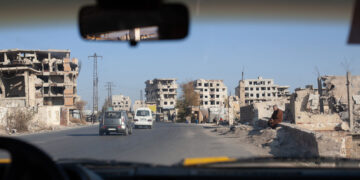Armenak Tokmajyan is an El Erian fellow at the Malcolm H. Kerr Carnegie Middle East Center in Beirut. His research focuses on borders and conflict, Syrian refugees, and state-society relations in Syria.
Russia's war in Ukraine has abruptly weakened Moscow's once-dominant role in Syria and put increasing stress on the arrangements it had in the country with key actors like the United States, Iran, Turkey and Israel. While some powers that have been involved in Syria's civil war are taking advantage of the new circumstances to change the situation to their advantage, Russia is trying to retain its central position by reminding everyone that Moscow's will still counts for a lot in Syria, including the relative de-escalation in fighting even as its civil war shows little sign of ending. This power competition over Syria, on the one hand, and the growing risk of turning Syria into a battleground for settling scores over Ukraine, on the other, could lead to dangerous new escalation and the end of whatever limited stability Syria has seen recently, which has been the result of increased cooperation among these very same outside powers that are now at odds.
President Vladimir Putin's invasion partly undid what Russia gained geopolitically from its earlier intervention in the Syrian war. As a global power involved in a conflict with far-reaching repercussions, Russia became a more visible and central actor in the Middle East and beyond. In the Syrian context, Russia's views mattered, and cooperation with Moscow became a necessity for other countries involved in Syria's civil war. With forces on the ground and direct access to all major players on the Syrian battlefield, most of all President Bashar al-Assad, Moscow developed a unique, dual position. It was not only an unavoidable mediator in all crucial cases around the war, but a de facto "local" partner in Syria to countries like Israel, Turkey and even the U.S.
Russia and Israel built close relations in Syria, particularly around the issue of Iran's presence. Despite ups and downs, the cooperation withstood various tests over seven years, enabling Israel to carry out regular strikes against Iranian targets in Syria. They have maintained a "deconfliction mechanism" to prevent Israeli and Russian forces from inadvertently clashing in Syria during those airstrikes. Meanwhile, in northern Syria, Turkey and Russia developed a complex relationship of cooperation and conflict over a number of issues, including the last Syrian opposition stronghold in Idlib province, Kurdish self-administration and border security. Russia and the Biden administration also had episodes of successful coordination, cooperating on humanitarian issues that resulted in Russia not vetoing crucial cross-border aid delivery to the opposition-held north. They even opened a political track with Russian and U.S. officials meeting in Geneva. All of this did not only make Russia central to the Syrian puzzle, it also brought the degree of de-escalation in the country over the past few years, with quieter frontlines and few major battles.
A protracted war in Ukraine could mean that the worst is yet to come in Syria as things break down between Russia and other outside forces.
- Armenak Tokmajyan
The war in Ukraine knocked out the Geneva track for Moscow and Washington, and there is a significant chance that direct, cross-border humanitarian aid delivery into northern Syria—the mandate for which needs to be renewed by the U.N. Security Council this summer—could fall victim to U.S.-Russia acrimony and end up being vetoed by Moscow. Such a scenario would make the prospects of cooperation between the two much harder, undercutting Washington's prioritization of humanitarian aid in Syria. Also, maybe needless to say, a Russian veto would have severe impact on the economy of Syria's opposition-held northwest, where vulnerable Syrians already face soaring prices of basic commodities because of the war in Ukraine.
The separate arrangements between Russia and Israel, and between Russia and Turkey, have both shown more resilience so far. Despite Israeli condemnations of Russia's invasion of Ukraine, Russia said it would continue their military coordination; Israel has since struck Iranian targets several times inside Syria. Turkey, for its part, has walked a tightrope. It has condemned the Russian invasion, sold some Bayraktar TB2 armed drones to Ukraine without the usual advertisement, and closed the Bosporus and Dardanelles Straits to Russian and non-Russian warships, per the Montreux Convention. But it has done all that without joining the Western-led sanctions against Moscow, fearing the harsh consequences on its economy as well as Russian retaliation in, for example, Syria. Russia, in turn, has tried not to alienate Turkey, including by reportedly blocking the Assad regime's recent proposal to escalate the fighting in Idlib.
As the war in Ukraine continues, however, it will put more pressure on the positioning of major powers in the Syrian conflict, which, in turn, would make maintaining all previous arrangements difficult. Some analysts in Israel worry that Russia is becoming less tolerant of Israel's airstrikes in Syria, given Israel's harsher words against Moscow over Ukraine, but also to signal its importance as a military power that claims to control Syria's skies. Along the Syrian-Turkish border, both Turkey and Russia have shown signs of escalation, and violations of the fragile cease-fires in the area have become more common. In this sense, an imminent end to Ukraine's war could contribute to maintaining some of the relative reduction in hostilities in Syria, and maybe even a return to some pre-invasion arrangements. But a protracted war in Ukraine could mean that the worst is yet to come in Syria as things break down between Russia and other outside forces.
If Russia's war in Ukraine drags on, it could ultimately flare-up frontlines, disrupt humanitarian aid and claim even more lives in this shattered country called Syria.
- Armenak Tokmajyan
The war in Ukraine and the weakened position of Russia in Syria have also heightened the competition among key regional powers that are more aggressively striving to increase their own influence in a sovereignty-robbed country in the heart of the Middle East that has been a fierce proxy battleground for over a decade now. In this sense, the most visible gains in Syria are Iran's. Not long after Russia's invasion of Ukraine began, Iran pursued what it has been best at: encroaching on more Syrian territory through Iranian-backed militias and the spread of Iranian arms. The war in Ukraine set the ideal context, with Russia quickly bogged down and not in much of a position to confront Iran. But Russia may have given more space to Iran to expand its reach in Syria to scare Israel as well as some Western and Arab counties—all of which consider the Iranian position in Syria a security threat—and remind them of Moscow's importance in any effort to counter Iran's influence on the ground. At the same time, Putin's costly invasion of Ukraine revived the Syrian regime's perennial fear for its survival, which has led Damascus to strengthen its other ties—first with Iran, and then with fellow Arab countries through a surprise visit by Assad to the United Arab Emirates.
Three days after war erupted in Eastern Europe, Syrian spymaster Ali Mamlouk was in Tehran in what seemed like a visit to presumably secure more Syrian support for further submission to Iran. Several Arab countries also made their own decisive moves. One could read Assad's visit to the UAE as an attempt by the Emiratis—supported by some Arab countries, Israel and perhaps even tacitly some Western countries—to counter Iran's attempts to take advantage of Russia's retreat and shifting priorities in Syria because of Ukraine. In another assertive move, the Emiratis have opened channels between Turkey and the Assad regime, as recently reported in Turkish media and according to sources in Damascus. Russia, for its part, hosted a meeting in mid-April in Moscow between Mamlouk and Hakan Fidan, his Turkish counterpart, reminding everyone of its role in Syria. They reportedly discussed "security and intelligence issues" as Russia tries, according to a Turkish government source, "to rearrange the situation in Syria" to minimize blowback over Ukraine.
All this renewed activity in and around Syria against the backdrop of the war in Ukraine could ultimately go in any direction. But it reveals just how vulnerable Syria is to geopolitical rivalries 11 years into its civil war, and to what an extent it has become a playground for major powers. If Russia's war in Ukraine drags on, it may also show how tensions among these powers over Ukraine ultimately flare-up frontlines, disrupt humanitarian aid and claim even more lives in this shattered country called Syria.





































